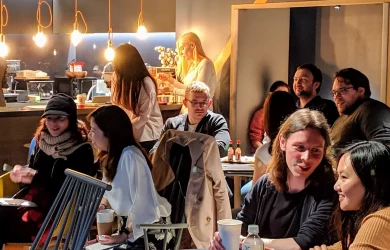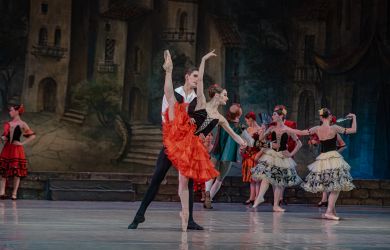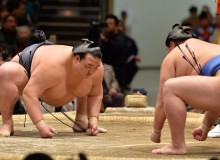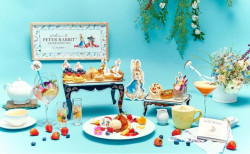Belle and Sebastian
The Scottish rockers headline Fuji Rock’s White Stage
July 10, 2015
Keyboardist Chris Geddes talks to Metropolis about the band’s new album, Girls in Peacetime Want to Dance, Scottish independence, and why Glasgow still rocks their world.
Are we right to think of Girls as something of a departure?
To a certain extent. We took some musical styles a bit further than we had before, but it was probably all things that previous records had hinted at rather than a complete departure. You hope every record you make will be different from previous ones in some way, but we’ve never gone for a complete reinvention.
What was the backstory behind the approach?
We’ve always been led by the songwriting, rather than deciding a musical direction first, and then fitting things ’round that. Stuart [Murdoch, lead singer and songwriter] said something early on about making the album like a ’70s Eurovision song contest, with each tune from a different country. It wasn’t meant entirely seriously but it conveyed the idea that it was OK if different songs went in different directions.
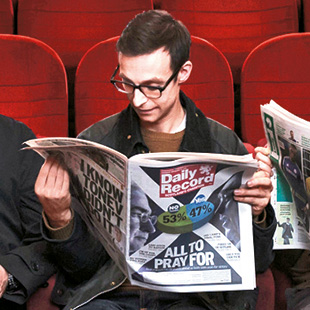
Chris Geddes
(Photo by Søren Solkær)
Tell us about your contributions as keyboardist in the band’s working process.
It varies a lot. Sometimes the songwriter has an idea for a part, and you take it from there; other times, they’ll play you the song, and the very first thing you come up with yourself is what goes on the record.
Still, other times, I might work trying to find an interesting sound, and then the sound dictates the part, or I might do some programmed stuff and add that, or something I’ve done on the laptop might be the start of a song for someone else. On this record there was more programmed stuff from me and Ben the producer than on previous records.
What’s your own personal favorite song on the new album, and why?
My favorite is “Ever Had a Little Faith?” because, even though it starts off sounding like a fairly straightforward “old” Belle and Sebastian song, by the end, we’ve taken it somewhere else. I really like “Play For Today” as well. I loved Stuart’s vocal on it, and then Dee Dee [vocalist and guitarist of Dum Dum Girls] came in and did a really great job with her part, and I love the way it builds to the end with all the effects and stuff.
How did you end up recording in Atlanta? What did that bring to the album?
We went there specifically to work with Ben Allen. It was really great. Ben; Jason Kingsland, who engineered; and Sumner Jones, who was the assistant, were all really cool guys. It was a very open atmosphere in the studio, and I learned a lot from each of them. We wouldn’t have made the same record anywhere else. Ben contributed a huge amount in terms of sounds and the direction of some of the songs. I think everybody really enjoyed being in Atlanta as well, the vibe of the place and the food.
Tell us about the press shot that shows the band holding newspapers with Scottish independence referendum headlines.
It just so happened that the photoshoot took place on the same day as the referendum, so the photographer, Søren Solkær, brought the newspapers along to use in the shoot. I was a bit hesitant to do it, from the point of view that all of the mainstream media was against independence, and I didn’t want posing with the papers to be seen as an endorsement of that. I’d been getting most of my news from social media, which was why I was surprised when it was a comfortable victory for the “no” side.
What song do fans call for most in concert, and why do you think that song touched a chord with folks?
People shout a lot for “This is Just a Modern Rock Song,” which we never really play, or “Your Cover’s Blown.” I guess when people shout for things, it’s often not because they expect you to play it, but to show that they are the kind of fan that wants you to play a seven-minute-long track. The song that connects most with the audience is probably still “Get Me Away From Here, I’m Dying,” because the lyrics are a manifesto for the early days of the band.
Over two decades of Belle and Sebastian, what’s changed the most, and what’s stayed the same?
Within the band, it’s been the changes in personnel that have made the biggest differences: Isobel, Stuart, David, and Mick leaving; and Sarah, Bob, and for this album, Dave McGowan joining. Everybody had brought something different to the group when they’ve been in it, and making this record with Dave as part of the group was really good. His playing on every song was amazing, and made everybody else raise their game. There’s certain things within the writing that have stayed broadly the same. We’ve always written songs based on the harmonies that evolved in ’60s rock and pop, and not followed recent trends. The records almost always consist of melodic, lyrical songs, rather than any other form of music.
How has “maturity” affected the band?
In terms of the music we make, not much. It’s more people’s personal circumstances that have changed over the years. But we’re in a band so that we can avoid maturity!
How does Glasgow continue to shape your sound?
It’s still important for me. I hear stuff recorded at Green Door, the studio next to our rehearsal space, that really excites me. My friend Holly, who puts on a psych weekender called Eyes Wide Open, has been really good at turning me on to touring bands that have come through. My friend Andrew still does his club Divine, where we heard a lot of stuff that shaped the sound of the band.
What do critics get right—and not—about the band?
Sometimes, I’ve read critical stuff about the band and thought there were some fair points, and other times there’s been both positive and negative things where I’ve read it and thought the person just doesn’t get what we’re doing. Maybe the main thing is, we think of ourselves as more pop than [the] critics, who put us very much in the “indie” or “twee-pop” box. It’s fine, it’s just a label. I sort my record collection by genre myself, although there’s no “twee-pop” section. I’d have us filed under “other”!
Fuji Rock Festival: White Stage, Jul 25. www.fujirock-eng.com

